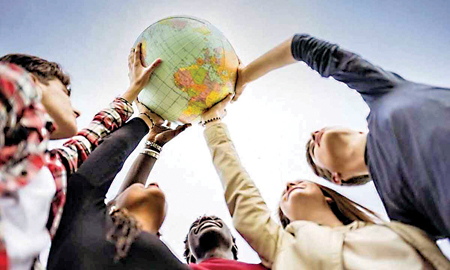 Since the earliest times, humanity has been on the move. Some people move in search of work or economic opportunity, to join family, or to study. Others move to escape conflict, persecution or large-scale human rights violations. In recent years, conflict, insecurity, and the effects of Climate Change, war and conflict have heavily contributed to the forced movement whether within countries or across borders. In 2020 over 281 million people were international migrants while over 59 million people became Internally Displaced Persons (IDPs) by the end of 2021.
Since the earliest times, humanity has been on the move. Some people move in search of work or economic opportunity, to join family, or to study. Others move to escape conflict, persecution or large-scale human rights violations. In recent years, conflict, insecurity, and the effects of Climate Change, war and conflict have heavily contributed to the forced movement whether within countries or across borders. In 2020 over 281 million people were international migrants while over 59 million people became Internally Displaced Persons (IDPs) by the end of 2021.
Female migrants constituted 48 percent of international migrants. Almost three out of four international migrants were aged between 20 and 64 years , whereas 41 million international migrants were under the age of 20. Most international migrants reside in Asia and Europe (31% each), followed by Northern America (21%), Africa (9%), Latin America and the Caribbean (5%) and Oceania (3%).
While most people migrate out of choice, others migrate out of necessity. The United Nations Refugee Agency (UNHCR) estimated that, by the end of 2022, the world hosted an estimated 35.3 million refugees, including 5.9 million Palestine refugees under the mandate of the United Nations Relief and Works Agency (UNRWA), as well as 5.4 million were asylum-seekers .
Statistical purposes
For statistical purposes, the United Nations defines an international migrant as any person who has changed his or her country of residence. This includes all migrants, regardless of their legal status, or the nature, or motive of their movement. Regardless of the reasons that compel people to move, migrants and displaced people represent some of the most vulnerable and marginalised groups in society, and are often exposed to abuse and exploitation, have limited access to essential services including healthcare, and are faced with xenophobic attacks and stigma fueled by misinformation.
On the other hand, many migrant workers are often in temporary, informal, or unprotected jobs, which exposes them to a greater risk of insecurity, layoffs, and poor working conditions.
Due to persistent lack of safe and regular migration pathways, millions continue to take perilous journeys each year. Since 2014 more than 50,000 migrants have lost their lives on migratory routes across the world, especially in the Mediterranean and near the US border.
 Today, there is a lot of antagonism towards migrants in many parts of the world. Many world leaders have taken an anti-immigrant stance, mainly to pacify the majority communities in their respective countries. There is a tendency to blame all ills of the economy and other sectors on migrants. What we do not realise is that many countries from USA to Australia have actually been established by migrants. Sri Lanka is no exception – our ancestors hailed from many other parts of the world including India. Evidence overwhelmingly shows that migrants generate economic, social and cultural benefits for societies everywhere. Yet, hostility towards migrants is unfortunately growing around the world. Thus solidarity with migrants has never been more urgent.
Today, there is a lot of antagonism towards migrants in many parts of the world. Many world leaders have taken an anti-immigrant stance, mainly to pacify the majority communities in their respective countries. There is a tendency to blame all ills of the economy and other sectors on migrants. What we do not realise is that many countries from USA to Australia have actually been established by migrants. Sri Lanka is no exception – our ancestors hailed from many other parts of the world including India. Evidence overwhelmingly shows that migrants generate economic, social and cultural benefits for societies everywhere. Yet, hostility towards migrants is unfortunately growing around the world. Thus solidarity with migrants has never been more urgent.
Stark reality
The stark reality is that we are all migrants. Migration is the very foundation of humanity. The first humanoids are believed to have migrated from what is now East Africa nearly 120,000 years ago to other parts of Africa and the world. In essence, human history is actually a story of migration. A sense of exploration and yearning to find what lay over the horizon took humans to other parts of the world.
Migration almost always enriches a country’s economy and culture. Many countries would not have developed to this extent if not for the massive contribution made by migrants. Today, globalization, together with advances in communications and transport, has greatly increased the number of people who have the desire and the capacity to move to other places.
It is, therefore, appropriate that the United Nations has set aside a separate day (December 18) as the International Migrants Day to mark the contribution of migration to the moulding of our world and to highlight the very modern issue of mass migration that occurs as a result of poverty, conflict and even environmental problems.
Illegal migration has become a major issue in many countries, to the point where extremist political parties have sprung up to “protect the borders” of their respective countries against a perceived “alien invasion”. These parties spread fear and suspicion about the immigrants among the native population. Respect for the fundamental rights and freedoms of all migrants is essential to reap the benefits of international migration, though countries are free to address concerns such as extremism and terrorism.
Migration can be both legal and illegal. Europe has faced a wave of illegal migrants coming over on rickety boats, with thousands losing their lives en route. But, many countries do offer a legal pathway for migration, mainly because their population is not adequate to meet the labour and professional services needs. The latest trend in this regard is the Digital Nomad Visa programs being introduced by any countries to attract Work From Home professionals.
In the other category are people who try to escape their own countries to regions such as Europe and Australia due to economic reasons, conflict or other factors. It must be noted that the poorest people in any country generally do not have the resources to bear the costs and risks of international migration. International migrants are thus usually drawn from middle-income households. If they succeed in their bid to reach a ‘greener pasture’, they become refugees or asylum seekers, but many of them end up being deported.
The trafficking and smuggling of persons is an integral part of migration, the difference being that persons are trafficked against their will for slavery or prostitution while those smuggled are undertaking the journey on their own volition. Human Smuggling Rings charge exorbitant amounts for a rickety boat ride and leave the migrants midway at sea with only two options – getting caught by navies of destination countries or death by drowning.
Talent pool
Migration does not even have to be from one country to another. Most countries suffer from the phenomenon of domestic migration, where youth from villages migrate to the more prosperous cities in search of jobs and educational opportunities. This has a severe effect on the villages as the talent pool available for farming and traditional village industries drops almost to zero. This is why it is essential to create equal opportunities for all youth in the villages as well as in the cities.
Migration, though not a new phenomenon by any means, is re-defining the world we live in. It is essentially a two-way street. Developing countries must do more to create opportunities for youth within their boundaries which will dampen the enthusiasm to migrate. Destination countries too must be more compassionate towards the plight of genuine migrants fleeing conflict and persecution while balancing their national interests and resources. Indeed. migrants have proven to be a source of prosperity, innovation, and sustainable development to countries of origin, transit, and host countries.
Their financial contribution through remittance offers a lifeline to families and spur local markets especially those of Low- and Middle-Income Countries while their role in the labour market remains invaluable as evident on the frontline of the Covid-19 pandemic response. Their knowledge, networks, and skills have greatly contributed to the development of resilient communities.
Strengthening the contribution of migrants to sustainable development requires collective effort to improve the governance of migration and addressing the challenges migrants face. The Global Compact for Safe, Orderly and Regular Migration (GCM) offers the opportunity and guidance to actualise human mobility and seize the opportunities it presents. Organisations such as the International Organisation for Migration (IOM) also plays a major role in addressing the problems faced by migrants, both legal and illegal. IOM works to ensure the orderly and humane management of migration, to promote international cooperation on migration issues, to assist in the search for practical solutions to the challenges of migration and to provide humanitarian assistance to migrants in need, including refugees and internally displaced people.
Positive contribution of migrants
The 2030 Agenda for Sustainable Development recognises the positive contribution of migrants to inclusive growth and sustainable development. The Agenda’s core principle is to “leave no one behind,” which includes migrants. Many of the Agenda’s Sustainable Development Goals (SDGs) contain targets and indicators which are relevant to migrants or migration. SDG targets 10.7 calls on countries to “facilitate orderly, safe, regular and responsible migration and mobility of people, including through the implementation of planned and well-managed migration policies.”
Secretary-General António Guterres has credited over 80 percent of those who cross borders in a safe and orderly fashion as powerful drivers of “economic growth, dynamism, and understanding”.
“But unregulated migration along increasingly perilous routes – the cruel realm of traffickers – continues to extract a terrible cost”, he continued in his message marking the day.
Over the past eight years, at least 51,000 migrants have died, and thousands of others gone missing, said the top UN official.
“Behind each number is a human being – a sister, brother, daughter, son, mother, or father”, he said, reminding that “migrant rights are human rights”.
“They must be respected without discrimination – and irrespective of whether their movement is forced, voluntary, or formally authorised”.
Guterres urged the world to “do everything possible” to prevent their loss of life – as a humanitarian imperative and a moral and legal obligation.
He pushed for search and rescue efforts, medical care, expanded and diversified rights-based pathways for migration, and greater international investments in countries of origin “to ensure migration is a choice, not a necessity”.
“There is no migration crisis; there is a crisis of solidarity”, the Secretary-General said. “Today and every day, let us safeguard our common humanity and secure the rights and dignity of all”.










